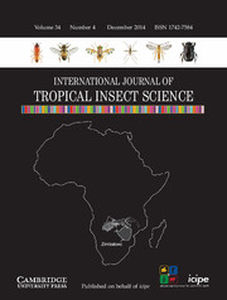Earlier this year, we appointed four regional editors as well as a number of new members to the editorial board of IJT. Our intention was and is to raise the profile of the journal to convince fellow entomologists to contribute high quality articles to IJT. Our ultimate objective is to nurture the journal so that it becomes the reference publication for tropical entomology. As we release this last issue of Volume 26, these targets remain unchanged.
Suffice it to say, the pan-tropical regions exhibit some of the most problematical insect pest and disease vector problems. Discerning readers of the journal will note that we have received contributions from entomologists from all over the tropics focusing on integrated pest and vector management, use of botanicals (and other practical measures, e.g. stored-product insect pest control), tropical agricultural pests research as well as host plant resistance and insect rearing, to name only a few subject matters. This research will, as usual, go a long way in alleviating the difficulties caused by insects for the people living and working in these regions.
For example, in this issue, our contributors from Africa, Asia and South America handle diverse topics ranging from research detailing the development of tolerance in Anopheles gambiae larvae to increasing levels of heavy metals in the water they live in, to biological control using entomopathogenic nematodes to control larvae that feed on root crops, and to identification of sorghum genotypes, an important cereal crop in the semi-arid tropics, with multiple resistance to pests. This illustrates how IJT is becoming a high-class, pan-tropical entomological journal.
I take this opportunity to thank the regional editors, editorial board members, peer-reviewers, subscribers, the IJT secretariat staff and CABI for the support they have given to the journal.
Three separate adjustments on partnerships and editorial policy of IJT are planned. The actions are to be implemented starting with this issue and continuing in early 2007, and are in keeping with our promise to improve the quality of IJT.
● Starting with this issue, we will join the Cambridge University Press journals publishing programme following their acquisition of the journals formerly published by CABI.
● From 2007 onwards, IJT will be published by the International Centre of Insect Physiology and Ecology (ICIPE) only and no longer jointly with the African Association of Insect Scientists (AAIS). As we strive to increase readership and submissions from the tropics in general, we believe that an association of IJT with only one entomological organization is not the right strategy. I want to take this opportunity and thank the colleagues from the AAIS secretariat for the long and excellent partnership, and encourage them and their fellow society members to continue contributing to the journal.
● Likewise, from 2007, IJT will discontinue the publishing of manuscripts in French. Moreover, in future only English abstracts will be required upon submission of manuscripts. This action has been necessitated by the shortage of French language reviewers. Thus, authors of French manuscripts are encouraged to translate their manuscripts into English before submitting them to IJT.
In the years to come, with Cambridge University Press as our new co-publisher, ICIPE is confident that IJT will continue to grow and increase its readership. Consequently, we encourage entomologists to contribute high quality articles to the journal and help make it the reference publication on tropical entomology.


